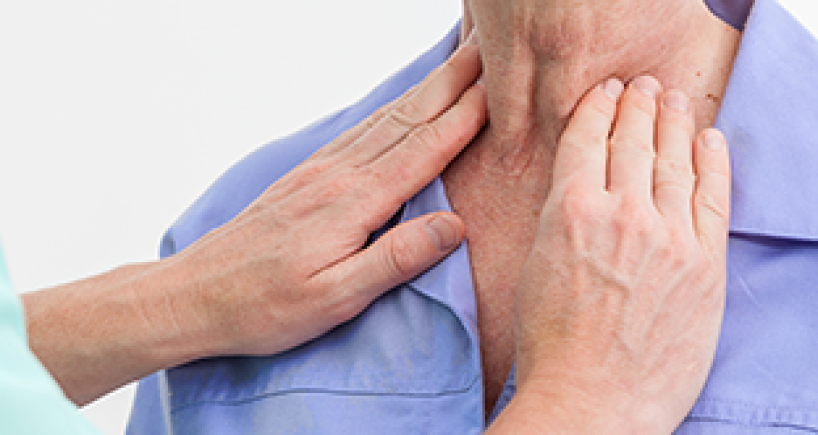
Diabetology/Endocrinology
Treat Thyroid Diseases To Protect Heart
Dr. Ajay Aggarwal Dec 19, 2014
 Thyroid gland is a butterfly shaped gland, situated in frontof the neck. The function of the thyroid gland is to absorb iodine, an element found mainly in salt, bread and fish, and convert it into thyroidhormones: Thyroxine (T4) and Triiodothyronine (T3). These hormones control the body’s metabolism, which controls the function of your heart, brain, skin and digestive system. This means that if your thyroid isn’t doing its job properly, it can affect almost every aspect of your health and make you feel unwell. Thyroid hormone is very important for normal cardiovascular function. For patients with heart disease, thyroid hormone abnormalities can worsen the underlying heart problem or cause new problems.
CAUSES OF THYROID DISEASE
Thyroid disorders are triggered by a range of factors. Autoimmune diseases, such as Hashi-moto’s thyroiditis, are a common cause. Autoimmune diseases occur when the immune system mistakenly attacks the body’s own tissues. It may be associated with other autoimmune disorders. Hyperthyroidism in older adults is most likely related to thyroid nodules,abnormal growths that form in the gland. There may be single hyper-functioning nodule (solitary thyroid nodule) or there may be multiple thyroid nodules (multinodular gland) in the thyroid gland.
HYPOTHYROIDISM VERSUS HYPERTHYROIDISM
Symptoms of a thyroid disease like hyperthyroidism such as weight loss, increased appetite, diarrhoea, heat intolerance, increased sweating, etc. are less common in older adults, and that these patients are more likely to present with no symptoms at all. This is referred to as apathetic hyperthyroidism and can bedifficult to diagnose. The cardiovascular symptoms and signs of thyrotoxicosis (when too much hormone is present) are some of the most characteristic and disabling manifestations of the disease. In hyperthyroidism, a fast heart beat or irregular heartbeats with arrhythmias could be a problem. Another common symptom of thyrotoxicosis is exercise intolerance and breathlessness on exertion. It can also result in heart failure, hypertension, and if patient already has coronary artery disease, hyperthyroidism could exacerbate the problem and result in heart attack or stroke. Most patients with hypothyroidism (when not enough hormone is present) have a few symptoms directly referable to the cardiovascular system. Hypothyroidism can cause left-sided heart failure, a potentially life-threatening condition. In hypothyroidism, the heart muscle is weakened. This means that the heart cannot pump enough blood with each heartbeat causing heart failure. Also it can cause low heart rate, hypertension (20-40 per cent), and elevated cholesterol. Hypothyroidism may predispose to the development of atherosclerosis and coronary artery disease as a result of above written metabolic abnormalities.
TREATMENT
Thyroid patients should make sure their disease is well treated and regularly followed. Once the hypothyroidism or hyperthyroidism is treated and stable, the risk for heart disease should be prevented. If they develop heart disease, they should make sure their doctors are aware of their thyroid disease. The standard treatment for an under active thyroid is the synthetic thyroid hormone levo-Thyroxine (Thyrox, Thyronorm). All the changes in cardiovascular functions in patients with hypothyroidism improve in response to treatment with T4 or T3.
Thyroid gland is a butterfly shaped gland, situated in frontof the neck. The function of the thyroid gland is to absorb iodine, an element found mainly in salt, bread and fish, and convert it into thyroidhormones: Thyroxine (T4) and Triiodothyronine (T3). These hormones control the body’s metabolism, which controls the function of your heart, brain, skin and digestive system. This means that if your thyroid isn’t doing its job properly, it can affect almost every aspect of your health and make you feel unwell. Thyroid hormone is very important for normal cardiovascular function. For patients with heart disease, thyroid hormone abnormalities can worsen the underlying heart problem or cause new problems.
CAUSES OF THYROID DISEASE
Thyroid disorders are triggered by a range of factors. Autoimmune diseases, such as Hashi-moto’s thyroiditis, are a common cause. Autoimmune diseases occur when the immune system mistakenly attacks the body’s own tissues. It may be associated with other autoimmune disorders. Hyperthyroidism in older adults is most likely related to thyroid nodules,abnormal growths that form in the gland. There may be single hyper-functioning nodule (solitary thyroid nodule) or there may be multiple thyroid nodules (multinodular gland) in the thyroid gland.
HYPOTHYROIDISM VERSUS HYPERTHYROIDISM
Symptoms of a thyroid disease like hyperthyroidism such as weight loss, increased appetite, diarrhoea, heat intolerance, increased sweating, etc. are less common in older adults, and that these patients are more likely to present with no symptoms at all. This is referred to as apathetic hyperthyroidism and can bedifficult to diagnose. The cardiovascular symptoms and signs of thyrotoxicosis (when too much hormone is present) are some of the most characteristic and disabling manifestations of the disease. In hyperthyroidism, a fast heart beat or irregular heartbeats with arrhythmias could be a problem. Another common symptom of thyrotoxicosis is exercise intolerance and breathlessness on exertion. It can also result in heart failure, hypertension, and if patient already has coronary artery disease, hyperthyroidism could exacerbate the problem and result in heart attack or stroke. Most patients with hypothyroidism (when not enough hormone is present) have a few symptoms directly referable to the cardiovascular system. Hypothyroidism can cause left-sided heart failure, a potentially life-threatening condition. In hypothyroidism, the heart muscle is weakened. This means that the heart cannot pump enough blood with each heartbeat causing heart failure. Also it can cause low heart rate, hypertension (20-40 per cent), and elevated cholesterol. Hypothyroidism may predispose to the development of atherosclerosis and coronary artery disease as a result of above written metabolic abnormalities.
TREATMENT
Thyroid patients should make sure their disease is well treated and regularly followed. Once the hypothyroidism or hyperthyroidism is treated and stable, the risk for heart disease should be prevented. If they develop heart disease, they should make sure their doctors are aware of their thyroid disease. The standard treatment for an under active thyroid is the synthetic thyroid hormone levo-Thyroxine (Thyrox, Thyronorm). All the changes in cardiovascular functions in patients with hypothyroidism improve in response to treatment with T4 or T3. Categories
Clear allMeet the doctor

Dr. Ajay Aggarwal
DIRECTOR ENDOCRINOLOGY | Fortis Shalimar Bagh
- Diabetology/Endocrinology | Endocrinology
-
17 Years
-
1200


















